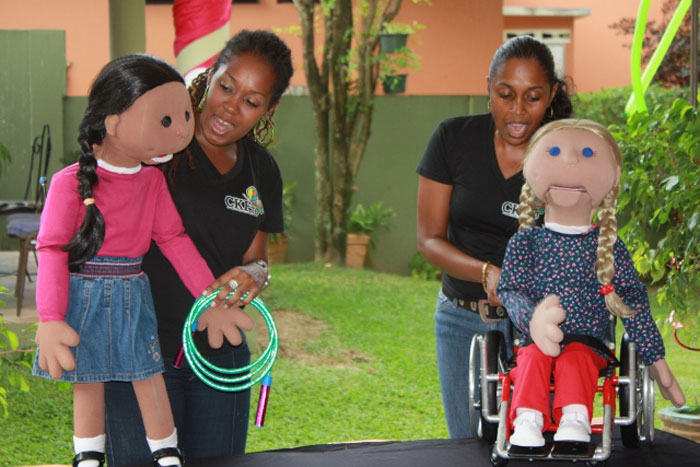
Organizations across the United States and around the world purchase PACER puppets to use in their communities. Puppeteers Michelle Laveau (left) and Natasha Babwah of the Caribbean Kids & Families Therapy Organization (CKFTO) do about 75 shows each year on the islands of Trinidad and Tobago.
Where in the world are the PACER puppets?
Since 1979, PACER’s COUNT ME IN® puppets have been making a positive impact across Minnesota, but their influence is now much broader. The endearing, life-size, multicultural puppets are teaching children across the United States and as far away as England about disabilities and bullying prevention.
“We have been using the PACER puppets for more than eight years in schools across England and it has been very successful,” said Gillian Archbold of Kidz Aware in West Yorkshire. “We have educated over 35,000 young people and the income generated from the educational programs has enabled us to support over 600 families of children with disabilities.”
More than 350,000 children have seen PACER’s COUNT ME IN® (disability awareness), KIDS AGAINST BULLYING (bullying prevention), and LET’S PREVENT ABUSE puppets. Led by volunteer puppeteers, the innovative, interactive presentations share age-appropriate messages, enabling children to learn through dialogue and question and answer. PACER makes the puppets and scripts available for purchase by other organizations to use in their communities.
“It’s incredible to see the faces of the children during performances. Their eyes just light up,” said Gregg Doan of Special Kids, Special Families (SKSF) in Colorado Springs, Colo., which began its puppet program in 2013. “There have been so many memorable moments.”
SKSF does shows across Southern Colorado and plans to expand into Denver. They have localized the scripts provided by PACER to fit their audiences. “The program has brought attention to our agency because we are the only one with the puppets in Colorado,” said Doan, whose organization also does puppet programs for adults with developmental disabilities.
Jean Harris of the Capital Center for Independent Living in Lansing, Mich., has been doing shows with PACER’s puppets since 2005 and uses the puppets to reach children in Head Start (ages 2 to 5) from low-income, diverse families. “It’s a great program with awesome puppets and really good scripts,” she said. “We researched other puppets but the PACER puppets looked more like kids, and of course the price was better.”
The puppets are hand-made in Minnesota, and their appearance can be changed to portray diverse communities. They can be shipped anywhere in the world. PACER also offers training to puppeteers.
Natasha Babwah, puppet program coordinator with the Caribbean Kids & Families Therapy Organization (CKFTO) in Trinidad and Tobago, recently visited Minneapolis for two days of training. CKFTO has been using the PACER puppets since 2013 and did 75 shows last year. “It has been such a wonderful experience to come to Minnesota and meet the people at PACER Center,” Babwah said. “This is a great program and an excellent teaching tool for young children.”
